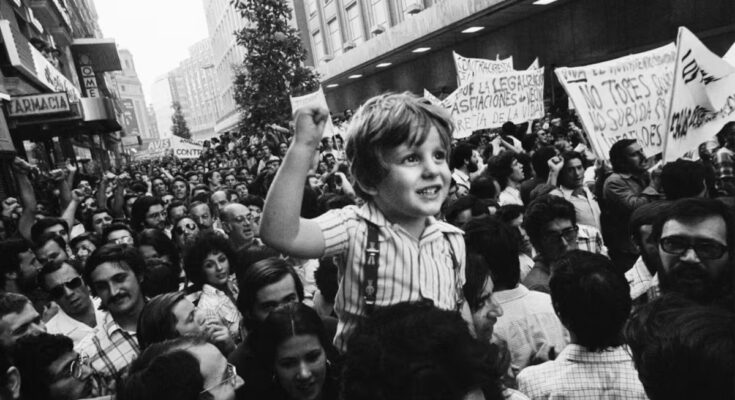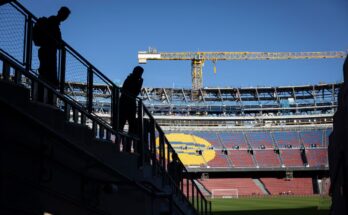I only remember other weeks of my life as politically exciting as those of November 1975: those of May 1968 in Paris. In both cases, suddenly, static and suffocating societies, which no longer corresponded at all to the expectations of young people, seemed to crumble, fall to pieces, exhausted and decadent, to make way for a new construction, for the imagination and creativity of generations who no longer identified at all with the framework in which they had grown up. Moments when everything seemed possible.
But the parallel ends here. Paris had been in turmoil, the heated discussions in the streets, in the occupied Sorbonne, the endless demonstrations. On the contrary, all of Spain was silent, waiting, in the first days of November; a tense wait, punctuated by the horrible “usual medical reports” in which the progress of Franco’s physical deterioration was detailed, in an end that had not quite arrived. And, after so many years of waiting, it seemed like a nightmare destined to never end. The bottles of champagne, as cava was called then, have been waiting in the refrigerators since October. When, finally, would the plug go out?
There had been enormous disturbances in recent years. From 1962, with the mining strikes in Asturias, supported by students, it was a rising wave that swept over workers, universities, schools, trade unions, political parties, professional associations and institutions of all kinds. The increasingly intense police repression was no longer able to contain that river; the continuous strikes, demonstrations, party proclamations, still clandestine, but present in rallies and in the streets. The harshness of the dictatorship continued to try to perpetuate itself in death and with death: two months earlier, in September 1975, eight people had been shot, in a desperate attempt to avert the foreseeable end. But nothing could stop that generational change, that hope of a large majority of the country that was fighting to free itself from an ancient and suffocating history.
Everything was still possible, even if nothing was certain, beyond joy, hope, complicity. Of course there were alternatives; Something extraordinary had happened: social movements did not limit themselves to formulating criticisms and demands. They had taken charge of the construction of a new country, of a new society, and had formulated its guidelines. I remember, for example, a manifesto that planned the education of the future, announced at the summer school in Barcelona in 1975, immediately replicated in Madrid and Valencia by other professional associations. The same thing happened in companies, in the nascent clandestine unions: CC OO, UGT and all the new acronyms that emerged then, under the massive impetus of workers’ support. Because it must be said: the role that these men and women from the factories, companies, universities, neighborhoods had in precipitating the end of that dictatorship has not been sufficiently recognized. An end that would not have happened if it had not been for their struggle and their commitment, in many cases their sacrifice.
The Franco regime tried to leave everything tied up and tied up tightly, without any cracks through which democracy could creep in; but democracy arrived thanks to popular mobilization, it was not the result of an agreement between parties. Simply, companies could no longer survive in that uncertain context of strikes, lack of dialogue with unions, without the possibility of bargaining and stability. The cords of the system were broken, even if it continued to annoy the reactionary groups and the usual right.
Beyond the specific projects, the proposals for change, what should have been built? The utopias, the theories invoked for decades, which had served as support for a terrible struggle, fell silent for a moment, taking refuge in everyone’s illusion. The opposition was divided: parties had proliferated in recent times, preparing their assault on power. Some, literally; I remember well what someone who later became a CiU politician told me a few years earlier: “It’s true that we’re making little progress, it’s not our time yet, but it will come, and then we’ll win.” The youngest, the most radical, groups and small groups, dreamed of revolution, that old ghost that runs through history. Still some, already very few, according to the Russian model; others with the latest Chinese model. Others, many more, have embraced the more varied and modern term “socialism”, perhaps Sweden, the Nordic countries… The most realistic thought of democracy; The republic was another option, the monarchy did not seem credible. The nebula persisted, unable to stop the illusion of creating a better future, where our dead would be rehabilitated, where dreams would come true.
Then came the party, unstoppable, projects of all kinds accelerated, still waiting, in the shadow of the pathetic Arias Navarro, who no one believed for a minute. The change took a few months to begin, until the summer of 1976, when Adolfo Suárez was appointed. The “nightlife” continued for a few years: the denunciation, the end of repression, the freedom, finally, to be who we were. Little by little people returned to their work, their lives, their businesses, and politics became an activity delegated to the parties.
Yet, every time I hear someone speak contemptuously of the “Regime of 78” I can’t help but think that much of that hope has come true, and that, fortunately, Spain today is vastly better than when it died in 1975.



